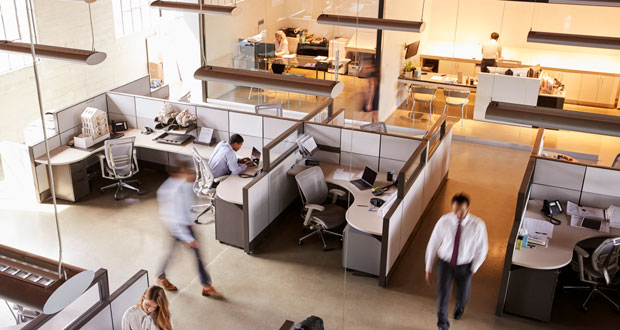Sixty-eight per cent of businesses expect to be promoting a more regular return to the office by the middle of this year, according to CBRE.
The global real estate advisor’s latest EMEA Occupier Sentiment Survey found that from nearly a quarter of those surveyed (23 per cent) said the process is already underway, with 45 per cent focussing on the remainder of H1 as the return period. The survey also pointed to some notable sector differences, with nearly 80 per cent of financial companies aiming for a more regular return by mid-year. By contrast, over a third of technology companies are allowing the process to take its own course without specifying a timeframe.
Whilst timelines are in place for returning, the survey revealed that organisations are clearly favouring choice over mandate. Only six per cent of companies surveyed are requiring employees to return to the office on a full-time basis, with 70 per cent permitting either a voluntary return to the office at the employees’ discretion, or requiring return on a part-time basis.
A clear majority (72 per cent) of companies say that they are moving towards a hybrid workplace model in which employees have a measure of choice within the framework of company guidance. Not only is this appreciably higher than last year (55 per cent), but most say that there is strong C-suite endorsement of this position and nearly two-thirds (65 per cent) say that sentiment has actually strengthened in this direction during the pandemic.
Richard Holberton, Head of EMEA Occupier research, CBRE commented: “Companies must now decide how much personal autonomy to allow as well as the balance between office and home. Over half of companies aspire to an equal mix of office and remote-based work – up from 29 per cent last year, while 38 per cent think their workers will be at the office for three or more days per week.”
Regardless of location, a growing number of companies also expect their portfolios to expand. A year ago, a third of companies were expecting to expand physically over the next three years. This has now risen to over 40 per cent overall, with the figure rising to 60 per cent in the technology sector.
Market changes have also led to increased popularity for the flex office market. The proportion of companies for whom flex space represents less than 10 per cent of their portfolio has halved from 86 per cent now to an expected 41 per cent in two years’ time.
Nearly 90 per cent of those questioned, indicated that that they would be making changes to their real estate strategy as a result of the pandemic. Linked to this, the survey also indicated the increasing importance of workplace strategy compared with the same period a year ago.
Companies are increasingly looking to increase collaborative areas – up from 36 per cent to 63 per cent and are revisiting design standards (up from 22 per cent to 50 per cent). Enhancing or increasing workplace amenities (up from nine per cent to 36 per cent) and altering layouts to provide more open space have also increased in popularity. The survey also indicated a heightened desire for an increased emphasis on health and wellness, with 41 per cent of business citing this as being important.
Holberton said: “Office occupiers face a complex matrix of issues as they adjust to and indeed shape a new reality. After a period of huge uncertainty, there is more clarity emerging over the direction of future real estate strategy, with only a small minority of companies reporting no change in their real estate strategies.”





